Experiments in reviewing the impact of content types on Edgerank
Along with most commentators on Facebook, I've written extensively about the new Edgerank algorithm in recent weeks. It's clear that many brands have experienced a significant drop in organic reach (although to be fair I'm not the only one who has reported a significant increase in reach since the back-end of November as Facebook appear to have tweaked the algorithm again - see below).

There have been myriad opinions expressed. I tend to agree with Jon Loomer's conclusions that viral reach is particularly affected and that even the tiniest "negative feedback" can significantly affect your reach.
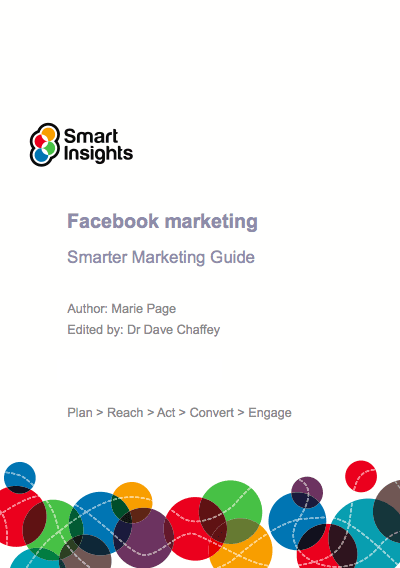
Recommended Guide: Smarter Facebook Marketing
Engage your Fans and use Facebook to Grow your Business in this 90 page Ebook by Marie Page.
Download our Guide to Smarter Facebook Marketing.
Rather than trawl through all the arguments again here I thought I'd instead share with you some numbers from my own Facebook Page in recent weeks. It's not possible to A/B test on Facebook so you will need to interpret the figures below in the light of reach being arguably affected by day of posting and the actual content being posted, but I think these findings provide a relatively accurate assessment of what works and doesn't work in terms of content type under the new algorithm. By the way, almost all of these updates were posted mid to late afternoon (the best timeframe for my UK/US fanbase).
You can click on any of the images to enlarge them.
Photos
Firstly, let's consider photos. Photos occupy loads of valuable real estate on the timeline. Here are three very different images - one is funny, one is arguably the most valuable in terms of learning for our customer base and one is just pretty. I'm not going to consider the value of content here (in fact the results in engagement of these three images is the reverse of what I normally find - humour almost always wins, then useful info that is relevant to our fan base then everything else). But if you look at the number of likes and comments, you can see which image wins in terms of reach.
At the time of posting our Page has 4,600 fans, so these posts are reaching between 11% and 18% of fans.

Photos have been downgraded
Photos used to enjoy considerable Edgerank weight. Facebook used to reward brands posting images with a high Edgerank score. As brands we got wise to that so many of us were rarely posting a link, question, comment any other content without the accompanying photo. In short we were gaming the system.
PostRocket reported the downgrading last month and my data below seems to support it. I've been posting a lot more text-only updates in recent weeks and it's taking my reach to (in this case) 32%.
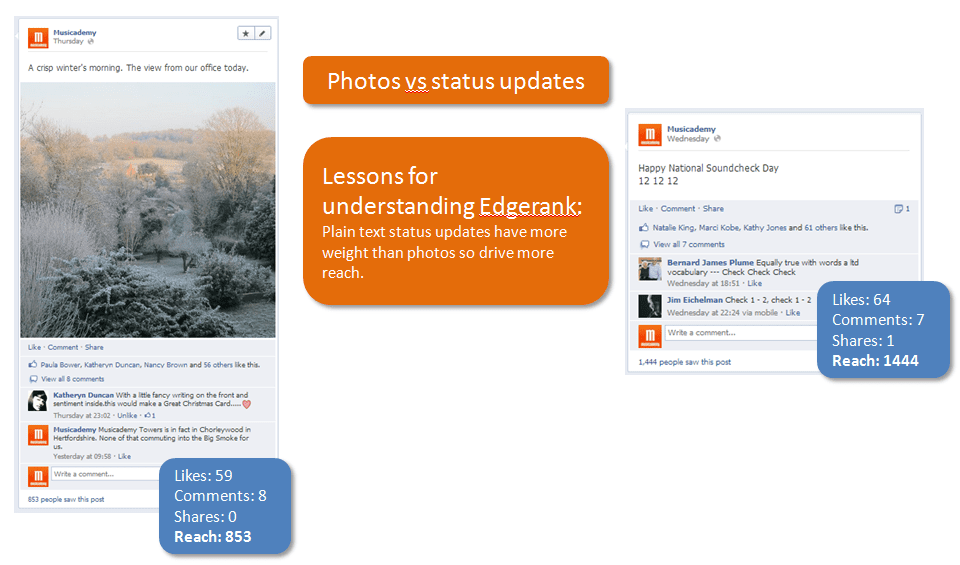
Video
I post a lot of video clips and wanted to experiment with the difference between YouTube and Vimeo with video uploaded directly to Facebook.
As far as I can see there are two advantages to uploading to Facebook. Firstly, fans can access the videos on Facebook using the tab/app on the home page. You get to see a thumbnail of the video in question rather than just the link to the YouTube Channel.

Secondly, Facebook video occupies more real estate on the timeline than Vimeo and YouTube links (see the Facebook video in the bottom left below).

I'm surprised that Edgerank doesn't favour Facebook-hosted videos but the above data would tend to suggest it treats them all equally.
I did find the data a little strange with Facebook-hosted video. No likes, comments or shares were displayed (so I've shown you metrics from Insights for comparison purposes) and for some reason I wasn't allowed to Promote this post. Elsewhere on Facebook the website clearly states that Facebook-hosted videos can be promoted so maybe this was just a glitch.
Photos vs videos
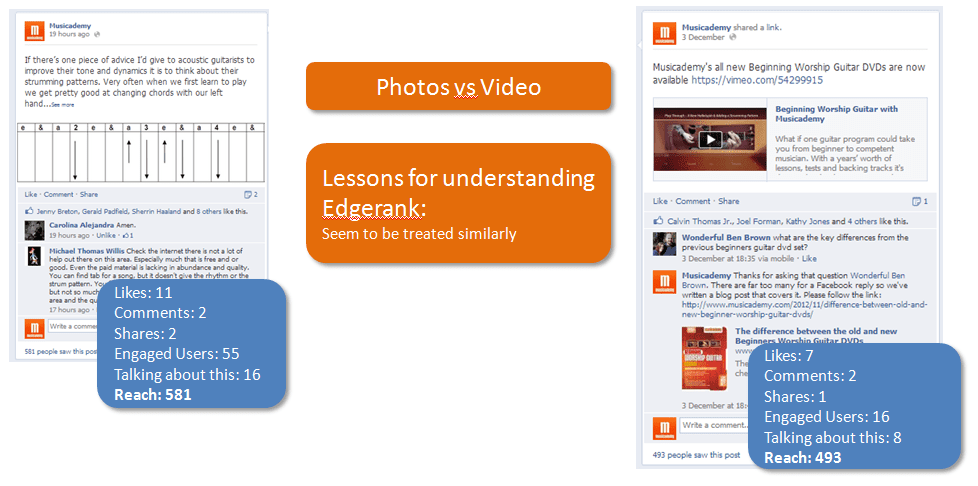
Whilst this is by no means a comprehensive test, the two posts above would suggest that photos and video enjoy similar Edgerank weight.
Links to URLs
Links to URLs don't really generate many likes, comments and shares partly because people need to leave the timeline to read the article and will then often comment on the blog post itself.
This apparent lack of engagement will be one reason why URLs are not performing well as regards reach.
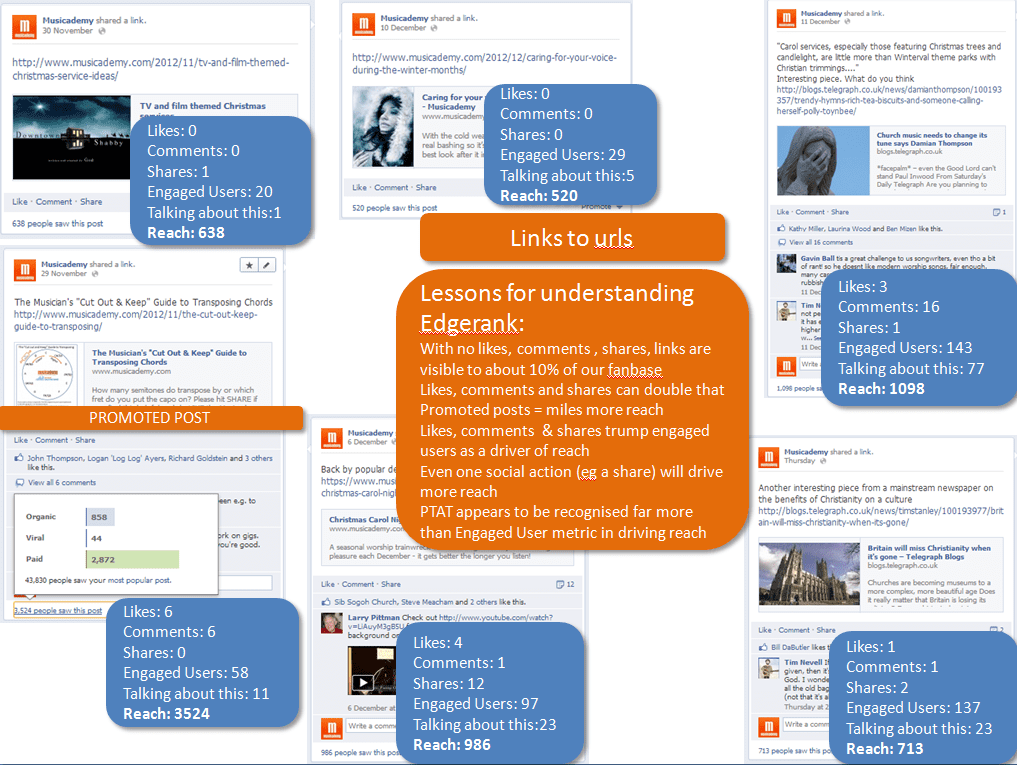
Links vs status updates
Plain text status updates again appear to win out with the new algorithm. Whilst the plain text post here does have a few more likes and comments than the link, the reach is half as much again despite the engagement rate and PTAT being considerably higher.
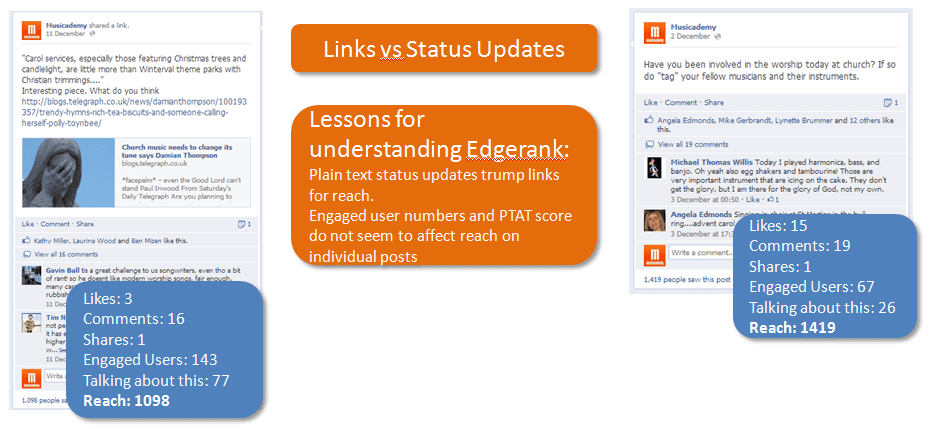
A word on using the word Christmas
Despite personally finding the "Christ in Christmas" image below a bit cringey, I knew that the Musicademy fanbase would love it. I decided to re-use an article I'd written last year that explored the Christian roots of the Xmas alternative and illustrated it with the image. Cue extraordinarily high virality ( 26%) and yet a reach of only 343 (a reach of only 7%). I can only assume that this is to do with the use of the "C" word in the post. The post would simply have been lost amongst the multitude of other Christmas-related posts on the newsfeed.
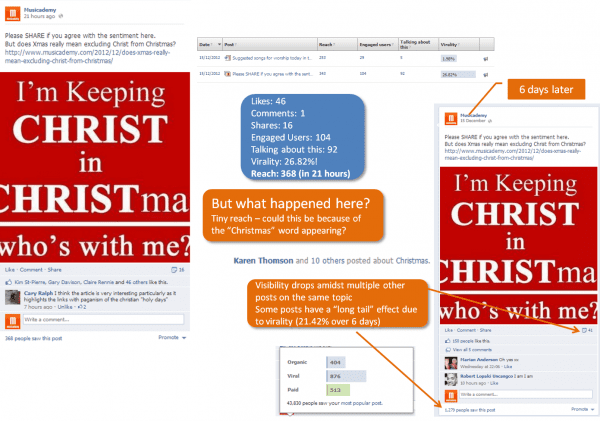
However 6 days later I checked back and found that the reach had leapt to a huge 1,279.
With time decay really pretty much over for organic posts in the first day or so, you can see that this "long tailed" effect is purely due to viral reach. It's a shame that Edgerank wasn't quick enough to pick that up when the post was fresh and so make it visible to more of our fans. After all, it had the stats - virality was showing up at 26% in my Insights data during that first day. Proof indeed that Edgerank is still not really quite delivering what fans are telling Facebook is important to them.
Marie Page @marie_page is co-founder of Musicademy, a specialist e-retailer teaching contemporary music on DVD and online. She also trains, consults and blogs on digital marketing and social media.














